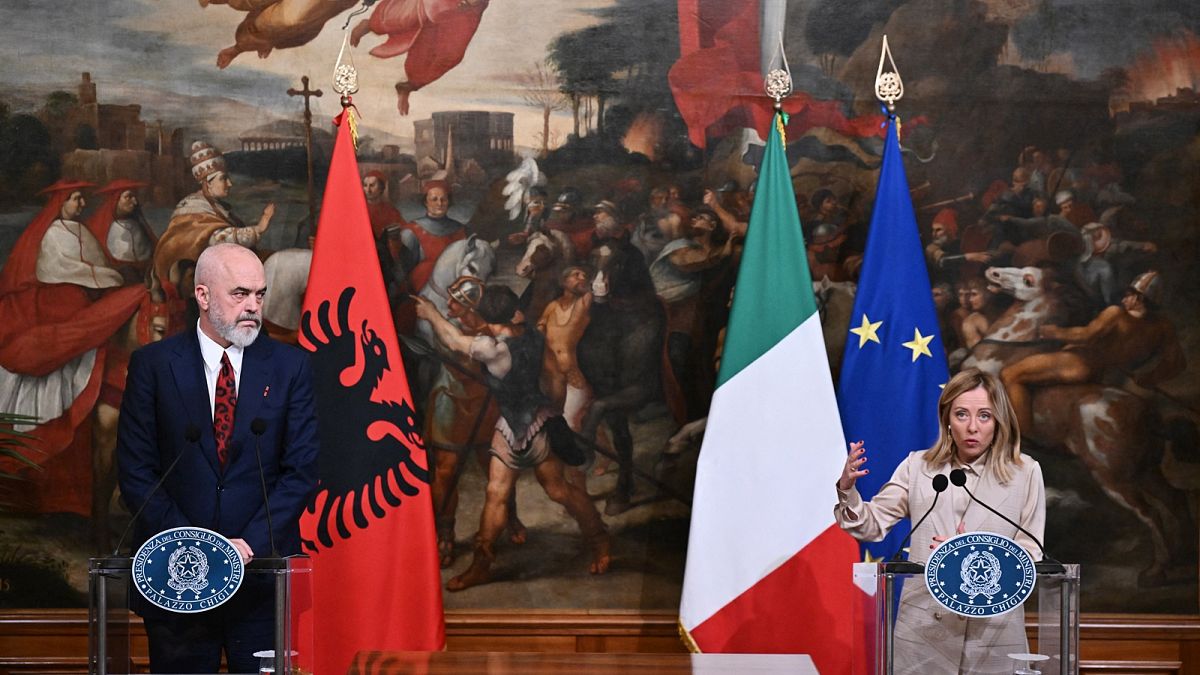The European Commission has issued a tepid response to the migration deal struck between Italy and Albania, simply warning it must comply with EU and international law.
"We're in contact with the Italian authorities because we need to see the details. We're asking to receive detailed information on this type of arrangement," a European Commission spokesperson said on Tuesday afternoon.
The agreement, the first of its kind for an EU member state, was announced on Monday by Italian Prime Minister Giorgia Meloni and her Albanian counterpart Edi Rama during a bilateral meeting in Rome.
Under the deal, which was unexpected, Italy will build two reception centres in the Balkan country to process the asylum claims of migrants rescued in the Mediterranean Sea by Italian authorities, who will then be disembarked in the Albanian coastal town of Shëngjin.
The hubs will have the capacity to house up to 3,000 migrants at a time, Meloni explained, with the goal of processing 36,000 applications per year. Pregnant women, children and vulnerable people will be excluded from the scheme.
The infrastructure will be paid for by Rome while Tirana has committed to providing security services and external surveillance. The launch has been set for spring 2024.
Notably, the two centres will be governed under Italian jurisdiction, a point that has raised concerns about the extraterritorial application of Italian and EU law in a country outside of the 27-member bloc.
"Member states are not as such precluded from adopting measures under national law to allow for applications for asylum to be made (by) persons from third countries," the Commission spokesperson said. "However, this must be done without any prejudice to the full application" of the EU's asylum rules.
The question of who will handle the deportation of rejected applicants remains unclear. Initial reports suggested the task would be carried out by Albanian authorities but PM Rama later said it would first fall on Italian shoulders.
The agreement was reached at the political level and still needs to be "followed by all the consequent regulatory provisions," Meloni noted. Amnesty International has already criticised the proposal as "illegal" and "unworkable."
The development immediately evoked comparisons with the controversial migration deal between the United Kingdom and Rwanda, which would see asylum seekers being transferred from British territory to the African country while their claims are examined. The deal is still blocked by British courts and no deportation has taken place.
Ylva Johansson, the European Commissioner for Home Affairs, said last year the UK plan was "not a humane and dignified migration policy." But Austria recently said it was open to exploring a Rwanda-style agreement with a non-EU country.
Asked about the comparison, the Commission spokesperson denied the similarity as the Italian-Albanian scheme would apply to those who have not yet reached Italian shores.
"We need first to understand the Italian case before we can go into details. From the first information that we see, this is not the same case. But again, we will need detailed information," the spokesperson said.
The news from Rome comes as the bloc's five-pronged migration reform enters the final stretch. The overhaul includes a speedier "border procedure" to examine asylum requests from applicants from countries with a low recognition rate, such as Tunisia, Egypt, Morocco and Pakistan. The procedure should last a maximum of 12 weeks.
In parallel to the reform, member states are pushing to strengthen the so-called "external dimension" of migration, coded language for partnerships with non-EU countries to prevent the departure of migrant vessels and crack down on human smugglers.
Italy, which this year has seen the irregular arrival of more than 145,000 migrants, has become one of the most vocal proponents of this new policy.
"I believe (the deal) could become a model of cooperation between EU and non-EU countries in managing migration flows," Meloni told Il Messaggero in an interview, noting she had informed the Commission in advance and not received any negative feedback.
"I think this agreement features a bold European spirit."
However, the most tangible result of the external dimension – the memorandum of understanding with Tunisia – has been rocked with disagreements, setbacks and an unprecedented refund since its signature in mid-July.
This article has been updated with more information.
